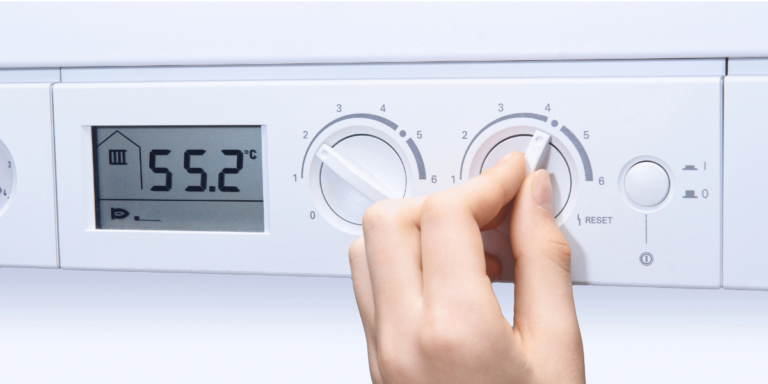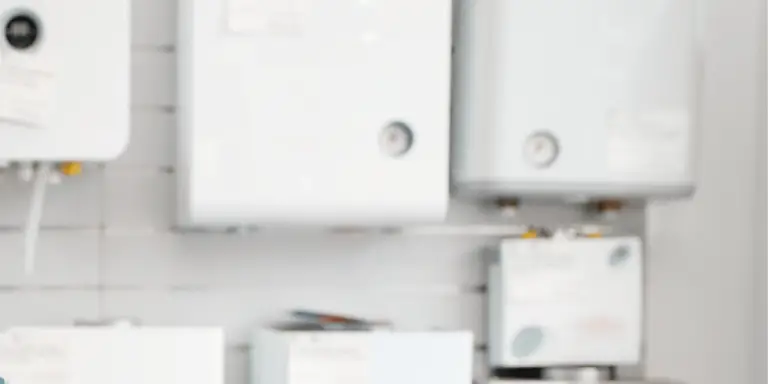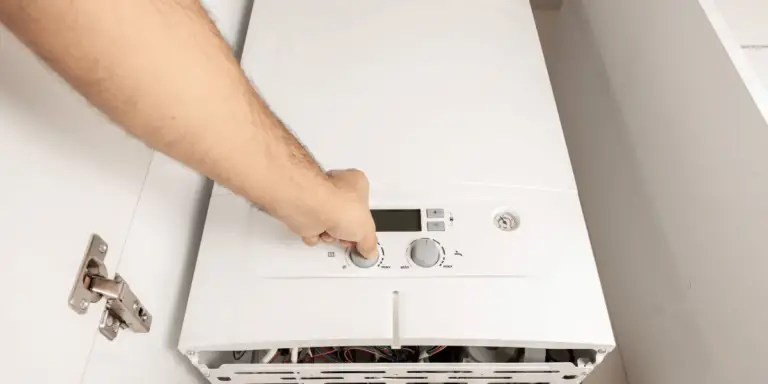A system boiler is a heating system that combines all the necessary components in one neat package. It includes the boiler unit, water tank/cylinder, pump, expansion vessel, and controls. This design allows for a more efficient and reliable heating and hot water solution, perfect for larger homes.
The built-in water tank or cylinder ensures a constant supply of hot water, making it ideal for households with multiple bathrooms. With its high efficiency and fast hot water delivery, a system boiler eliminates the need for a separate water storage tank and provides instant hot water whenever you need it. So if you’re tired of chilly mornings and waiting ages for the shower to warm up, a system boiler might just be the perfect fit for you.
Key Takeaways
- System boilers are suitable for larger homes and provide both heating and hot water.
- They offer high efficiency and fast hot water delivery.
- System boilers do not require additional tanks in the loft and can be used with renewable energy sources.
- Proper installation, maintenance, and compliance with safety regulations are essential for the effective functioning of a system boiler.
What is a System Boiler?
A system boiler, with its built-in water tank and efficient heating capabilities, is the perfect solution for larger homes that require fast hot water delivery and compatibility with renewable energy sources.
Unlike regular boilers found in older homes, a system boiler does not need a separate cold water tank in the loft. However, it does require a hot water cylinder, which can be placed anywhere in the home, to provide a constant supply of hot water on demand.
In addition to providing hot water, a system boiler also powers the central heating system in your home. It works by heating up the water stored in the cylinder and distributing it throughout the house via radiators or underfloor heating. This means that you can enjoy warm and cosy temperatures all year round.
One of the key benefits of a system boiler is its high efficiency rating. With an A-rated efficiency, it consumes less energy compared to older boiler types, resulting in reduced carbon emissions and potential energy savings on your utility bills. Additionally, system boilers are compatible with renewable energy systems such as solar panels or heat pumps, allowing you to further lower your environmental impact.
Overall, if you have a larger home and desire fast hot water delivery along with efficient central heating capabilities, a system boiler is an excellent choice to consider. Its integration of a hot water cylinder within the boiler unit ensures convenience and space-saving benefits while maintaining optimal performance and energy efficiency.
How does it work?
To understand how it operates, let’s explore the inner workings of this type of heating and hot water solution.
A system boiler is a highly efficient option that provides both heating and hot water for larger homes. Unlike how combi boilers work, system boilers are connected to the cold mains. They utilise a separate hot water cylinder to store hot water, ensuring a steady supply even during high demand.
The process starts with the boiler unit heating up water, which is then circulated through the central heating system via pipes. At the same time, a coil in the cylinder carries the central heating water at high temperature through the cylinder, heating its contents. This allows the now heated water to be transferred to multiple taps and showers at once.
A key advantage of a system boiler is its ability to meet high hot water demand without compromising on heat supply. The stored hot water ensures that there is always enough available, even during peak usage times.
The pressure within a system boiler is maintained by an expansion vessel, which absorbs any excess pressure as necessary. This helps to keep the ideal boiler pressure and prevents damage to components.
When it comes to energy efficiency, most system boilers are rated A for their efficiency levels. They consume less energy compared to older models, resulting in reduced carbon emissions and potential energy savings on your bills.
Overall, a system boiler offers an effective and convenient solution for meeting both your heating and hot water needs in larger properties with high demands for hot water supply.
Suitability for your Home
Is your home spacious and in need of a heating and hot water solution that can handle high demands? If so, a system boiler may be the perfect choice for you.
Unlike a regular boiler, which requires separate hot water cylinders, or a combi boiler, which may struggle to meet high hot water demand simultaneously from multiple outlets, a system boiler is designed to provide heating and hot water to larger homes with ease.
A system boiler is ideal for properties where there is enough space for installation. It consists of a boiler unit and a water tank/cylinder, allowing it to store and deliver hot water quickly and efficiently. This means no more waiting around for the shower to warm up or worrying about running out of hot water during peak usage times.
With its compatibility with multiple heating zones, a system boiler allows you to control different areas of your home independently, ensuring maximum comfort and energy efficiency. Moreover, it can be used with renewable energy sources such as solar panels or heat pumps, further reducing your carbon footprint.
If your home has higher than average demands for heating and hot water, consider upgrading to a system boiler for its superior performance and reliability.
Determining the size needed
When determining the appropriate size for your heating and hot water solution, it’s crucial to consider factors such as the number of radiators in your home and the level of demand you expect.
The size of a system boiler is measured in kilowatts (kW) and it represents the amount of heat output it can provide. Choosing the right size will ensure that your system boiler operates efficiently and effectively.
The number of radiators in your home is a key factor in determining the size needed for your system boiler. For example, if you have a home with 6 radiators, a 12kW system boiler would be suitable. However, if you have more radiators or larger rooms that require greater heat output, you may need a higher kW rating.
Additionally, it’s important to consider the level of demand you expect from your heating and hot water system. If you anticipate high usage or have multiple bathrooms that require hot water simultaneously, a larger sized system boiler may be necessary to meet these demands.
By taking into account both the number of radiators in your home and your expected level of demand, you can accurately determine the size needed for your system boiler. This will ensure optimal performance and energy efficiency for your heating and hot water needs.
Pros of System Boilers
High water demand
A system boiler is the perfect choice for homes with high water demand. It can provide hot water to multiple outlets simultaneously. Unlike conventional boilers, a system boiler has an integrated cylinder, eliminating the need for additional tanks in the loft. This makes it particularly suitable for larger homes with greater hot water requirements.
The system boiler connects directly to the mains supply, ensuring a constant and reliable hot water supply throughout the house. It can deliver hot water at a fast rate, ensuring minimal waiting time for showers or baths. This is especially beneficial for households with multiple occupants or those who frequently use hot water simultaneously.
So, if you have a larger home and require a high volume of hot water, a system boiler is an efficient and practical solution to meet your needs.
Quick heating time
A system boiler offers a quick heating time, allowing you to enjoy hot water whenever you need it without delays. Unlike other boilers, it is designed to efficiently heat both your radiators and hot water tank. This means you can have multiple outlets running simultaneously without any performance issues.
The convenience of the quick heating time is not the only benefit, as it can also lead to potential savings on your energy bill. By using an efficient boiler like a system boiler, you can ensure that your hot water is produced promptly while minimising energy wastage.
Eco-friendly option
One standout feature of a system boiler is its compatibility with renewable energy sources, making it an eco-friendly option for environmentally conscious homeowners. By integrating solar power, system boilers can significantly reduce their carbon footprint and reliance on fossil fuels.
The water tank in a system boiler allows for the storage of solar energy, which can be used to heat water and provide central heating throughout the home. This makes the system boiler not only energy efficient but also cost-effective in the long run.
With the ability to harness solar energy, homeowners can enjoy hot water and heating without contributing to greenhouse gas emissions. Investing in a system boiler with solar capabilities is a smart choice for those looking to lower their environmental impact while enjoying reliable and efficient heating systems.
Improved water pressure
Enhance your shower experience with the water pressure of a torrential rainforest downpour, thanks to the improved performance of a system boiler. Unlike other types of boilers, a system boiler is designed to provide excellent water pressure throughout your home.
It achieves this by directly connecting to the water main, bypassing the need for a cold water feed tank in the loft. Instead, it utilizes a mains water supply, allowing for higher water pressure and more efficient hot water delivery.
With a system boiler, you can say goodbye to weak showers and slow-filling baths. The increased water pressure ensures that multiple outlets can be used simultaneously without any loss in performance. Whether you’re running multiple showers or using hot water in various parts of your home at the same time, you can trust that your system boiler will deliver consistent and powerful flow.
So if you desire an invigorating shower experience and want to bid farewell to low-pressure frustrations, consider investing in a system boiler for improved water pressure throughout your home.
Extra loft space
One advantage of a system boiler is the extra loft space it provides. Unlike a regular boiler, which requires a cold water tank in the loft, a system boiler only needs a hot water cylinder that can be placed anywhere in the home.
The absence of bulky water tanks also makes it easier to install the system boiler in properties where space is limited. So if you have a small property or limited space in your loft, a system boiler could be the perfect option for you.
Not only will it provide efficient heating and hot water throughout your home, but it will also free up valuable space for your bathroom or other areas of your property.
Cons of System Boilers
Limited hot water availability
One of the main disadvantages of system boilers is that the amount of hot water available is limited to the capacity of the hot water cylinder. This means that once the stored hot water is used up, you’ll need to wait for the boiler to heat more water. This can be inconvenient, especially in larger households where hot water demand is high.
Space requirements
When installing a system boiler, you must have enough space for both the boiler unit and the water tank/cylinder. The size of the system boiler can vary depending on your home’s heating demands. Generally, it requires more space compared to other types of boilers.
The water tank or cylinder is a vital component of a system boiler as it stores and heats the hot water distributed throughout your home. Consider where you can accommodate the boiler unit and the water tank/cylinder in your property. If you have limited space internally, explore options for installing an external cylinder or locating them in alternative areas such as airing cupboards or garages.
Additionally, ensure there is adequate space for associated components like expansion tanks and any necessary flue systems during the installation process.
Costs
Did you know that the cost of a system boiler can range from £500 to £2000, depending on factors such as size, model, and manufacturer? The price of a gas system boiler can vary based on the features and capabilities it offers.
Entry-level boilers are suitable for middle-of-the-range homes with slightly higher energy requirements and typically fall within the lower end of this price range. On the other hand, premium models, like those offered by Worcester Bosch, cost upwards of £1500 and are ideal for homes with significant heating demands. Check out our guide on the best boiler brands for more information on which boiler manufacturer came out on top.
When considering the cost of a new boiler, it’s important to also factor in the installation costs. Professional installation is necessary to ensure proper functioning and safety. The installation cost will depend on various aspects like the complexity of the project and any additional work required for connecting it to your existing heating system.
It’s worth noting that while a system boiler eliminates the need for a separate storage cylinder like regular boilers, it does require more space for installation compared to other types of boilers. This may mean some adjustments or modifications are needed in your home.
To make an informed decision about installing a system boiler, it’s recommended to consider both the initial investment in terms of boiler price and installation costs, as well as potential long-term savings on energy bills. Additionally, research government grants or incentives that may be available to help offset some expenses associated with upgrading your heating system.
Frequently Asked Questions
Can a system boiler be used with solar panels or other renewable energy sources?
Yes, a system boiler can be used with solar panels or other renewable energy sources. This allows you to reduce your carbon footprint and make your heating system more environmentally friendly.
Are system boilers compatible with smart home heating controls?
Yes, system boilers are compatible with smart home heating controls. This allows you to control your heating and hot water remotely using a smartphone or voice assistant, providing convenience and energy efficiency.
Can a system boiler be installed in a property with limited space?
Yes, a system boiler can be installed in a property with limited space. However, it is important to ensure that there is adequate space for the boiler unit and water tank/cylinder, as well as proper ventilation and insulation.
Do system boilers require a separate water tank for hot water storage?
No, system boilers do not require a separate water tank for hot water storage. The water tank is built into the boiler itself, providing both heating and hot water without the need for additional tanks in your property.
Are system boilers more expensive to maintain compared to other types of boilers?
No, system boilers are not necessarily more expensive to maintain compared to other types of boilers. They require annual servicing, regular checks, and cleaning like any boiler. Maintenance costs may vary depending on the specific model and any additional components or features.
Conclusion
In conclusion, if you’re looking for a reliable and efficient heating and hot water solution for your larger home, a system boiler may be the right choice for you.
With its high efficiency and fast hot water delivery, it can meet the demands of multiple outlets simultaneously.
However, it’s important to consider the higher upfront cost and ongoing maintenance requirements.
By carefully assessing your heating needs, available space, and budget, you can determine whether a system boiler is suitable for your home.






